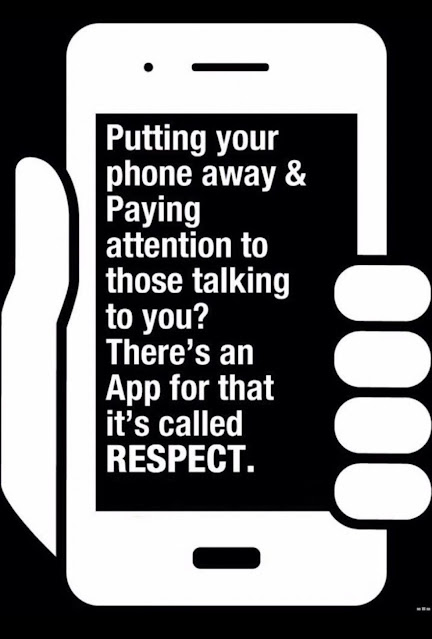What Age Should I Let My Kid Have a Cell Phone? Advice For Parents on Setting Rules & Boundaries for Kids & Teens with Cell Phones
All of My Friends Have Cell Phones!
Has your child been begging you to get her a cell phone? Is she lamenting she's the only person in her peer group without one. She may be right.
A study by Common Sense Media, an organization that conducts original research to ensure the digital well-being of kids, reports these mind-blowing statistics:
- By age 11, more than half of U.S. kids possess a cell phone.
- By age 12, two-thirds of kids have a phone.
- By age 14, teens are as likely as adults to have a cell phone.
What's a parent to do?
Cell Phones Are an Artificial Form of Communication
Buying your child a phone today isn't like it used to be when rotary and touchtone phones were the standard forms of communication. If you grew up in the age when extension cords from a wall-mounted phone could stretch to nearly every room in your house, you remember spending hours on it talking to friends, family, and love interests.
The biggest difference between antiquated phones and cell phones is the way they are used. Cell phones ironically inhibit authentic communication. Kids no longer spend hours conversing, problem solving, and relationship-building to grow socially and emotionally. They speak in emoticons, abbreviations, video clips, and short phrases--even when they are sitting right next to each other!
Not hearing someone's intonation can easily lead to misunderstanding. A concise text can sound aloof, angry, and detached when the person would sound warm and cheery if speaking the same phrase out loud.
Just visit a Walmart electronics department and try engaging the geeky clerk in conversation. He's a tech junkie whose eyes will grow large and incredulous as he watches your lips move, as if it's his first encounter with audible speech. He will point and grunt in response like a caveman.
Is this what we want for our children?
The second biggest problem is cell phones lead to excessive screen time consumption, which is very harmful to kids. If you have a moment, be sure to read 5 Reasons Parents Should Limit Screen Time and How to Do It for some excellent advice on curtailing this addictive and destructive trend.
When we were kids, phones didn't have screens and Internet access, so if you're trying to convince yourself it's just a phone, you're wrong. Kids with cell phones have access to games, music, movies, social media, and sites you'd never want them to stumble upon.
What Do the Professionals Say About Cell Phones For Kids?
The American Academy of Pediatrics (AAP) is concerned about kids having cell phones, but maybe not for the reasons you'd think. The AAP takes issue with the amount of radiation cell phones emit and the harm "distracted" accidents cause children. The radiation exposure is linked to headaches, sleep problems, depression, and in some cases, brain and heart tumors. Click here for more guidance from the AAP on best practices for kids with cell phones.
The AAP once recommended less than two hours per day of screen time for kids over age two, and no screen time for kids under two. In light of the tech explosion, they have surrendered this position and now urge parents to use their best judgment in monitoring screen use and mitigating the potential outcomes.
It's impossible not to notice how kids walk with cell phones in hand, chins down, always checking the screen, waiting for their next hit of dopamine. Neuroimaging is finding too much screen is literally affecting their brains. You can read this article in Psychology Today for the scientific evidence correlating excess screen to brain impairment, but I will put it in layman's terms for you: too much screen bad.
I spoke with a sixth-grade guidance counselor about the ideal time to let kids have cell phones. She said to put it off as long as possible. Kids, she reminded, have everything they need while at school, and it's easy for them to contact a parent when necessary. Kids with cell phones, especially girls, end up on social media where there is endless drama and bullying.
Social media seems to be the chief boogie monster to watch for if you allow your children to have a cell phone. According to the AAP, recent research indicates that there are frequent expressions of offline behaviors, such as bullying, clique-forming, and sexual experimentation, that have introduced problems such as cyberbullying, privacy issues, and sexting. Other problems that merit awareness include Internet addiction and concurrent sleep deprivation.
Just imagine the digital footprint your kids can make with a cell phone you couldn't have dreamed of when twirling an old phone cord around your finger. Everything they post in print or picture form can and will be used against them.
How to Know If Your Child Is Ready for a Cell Phone
All children mature at different rates, and as the parent, you will recognize whether your son or daughter is ready to appropriately handle the responsibilities of cell phone ownership. Here are just a few indicators your child can be trusted with a phone:
- You child completes her homework each day without you looking over her shoulder to be sure she hasn't forgotten an assignment, and she maintains good grades.
- Your child remembers all the belongings she needs to take to school each day, and she never leaves anything at school that needs to return home.
- When you give your child screen time limits, she always ends her screen usage at the set time.
- Your child is generally obedient and respects all other house rules you have established.
- Your child is physically active and gets adequate exercise.
- When asked to do chores, your child does a thorough job, does not procrastinate, and maintains a good attitude.
- Your child is kind and respectful of others.
- Your child never sneaks behind your back to do things you wouldn't approve of.
This is not a comprehensive list, only a guide to assess your child's readiness. You know your child better than anyone. If he is consistently responsible in a variety of situations, then he won't likely disappoint you with his cell phone conduct. Conversely, if you read the bullet points and are scratching your head because your child struggles in many of those areas, it might be better to wait another year to re-evaluate whether he can be trusted with his own phone.
Set Boundaries for Your Child's Cell Phone Usage
Taking the leap to purchase a cell phone for your child does not mean you should allow him unfettered access to it.
One mom laments, "My kids used to read, draw, and be physically active. Ever since they got phones, all they want to do is lay around on their beds and play on them."
Who's at fault?
Without limits, of course kids are going to take advantage! It's human nature. It's your job as the parent to establish boundaries for cell phone usage no matter what ages your kids are.
Let's look at what a typical day should look like in your home for your tweens or teens with cell phones before we tackle the basics of cell phone etiquette.
Your kids' cell phones should be plugged in and charging at a place that isn't easily accessible to them throughout the day. If you allow them to have phones in their rooms, they will be on them every time you're not looking.
Our firstborn was permitted a cell phone three months before she turned 13. We originally planned for her to get one at age 16 when she landed a job, but we noticed she was being unintentionally "left out." Though she had a large friend circle, the majority of them had cell phones, so they bantered playfully in group texts and on Snapchat, and she was like a homeless person out in the cold, peering into a window where everyone was warm and happy. It broke our hearts. We didn't want her to be inadvertently ostracized socially, so we relented and gave her an extra cell phone we already had. Let me point out that your motive to give your child a cell phone should never be about keeping up with the Jones'; it's about making sure your child doesn't become an accidental outcast when she's at a critical stage of social development.
Since our daughter spends most of her time upstairs, we require her to plug in her cell phone on our desk in the downstairs family room. It's out of sight and out of mind.
In the morning, our daughter checks her messages and puts the phone in her backpack to take to school. It remains in her backpack until cell phones are allowed to be accessed (when classwork is completed, while walking across campus, during lunch breaks, on the bus, etc.). The second she returns home, the phone is plugged in on our desk. She is not allowed to touch her phone again until all of her homework is completed. Since homework takes the majority of her evenings, she rarely even checks her phone before bedtime.
On weekends, our daughter almost forgets to check her phone because she's busy doing other things, but typically, she'll check her messages first thing in the morning and again in the evening.
Since we are sticklers about allowing a maximum of two hours of screen time each day, any additional time she wants to spend on her cell phone counts towards her 2-hour limit.
We are delighted to find a successful compromise where our daughter can have a cell phone and interact with her peer group while simultaneously obeying our usage rules so she doesn't become consumed by it.
You might ask, What if I've never established these boundaries? How can I rein my kids in when it seems too late?
While it's easier to set boundaries at the onset rather than curb bad behaviors that have become habitual, it's important to remember YOU are the parent and reserve the right to implement changes any time you see they are warranted.
It's never too late to establish and enforce new rules, especially when it concerns the well-being of your children. If your kids are spending an inordinate amount of time on their phones, set new rules. Yes, your kids are going to groan, lament, and have an attitude about it, but you've got to have a backbone and PARENT. Don't throw your hands up in despair. No one ever said parenting is easy. Any parent who acts like they can't do anything about the amount of time their kid is spending on a cell phone is a lazy parent.
Aside from cell phone access times, what other boundaries should be set?
I was surprised one day when my daughter came home and gave me a cell phone number of a friend's father and asked me to text him--his daughter isn't allowed to share her cell number until her father has approved the contact. Pretty smart!
Let your kids know you reserve the right to do random checks of their cell phones. Some parents install spyware to monitor their children's cell phone activity and track them via GPS. You want to respect your child's privacy, much like you would refrain from reading her diary; however, your first priority is always your child's safety. Do what you need to do.
On one of my random cell phone checks, I discovered my daughter (a straight-A student) had taken a picture of her homework and texted it to friends so they could copy her answers. That is not okay. Supposedly, the two friends had forgotten to do the homework and didn't want to fail the assignment, but I explained by bailing them out, they could learn to take advantage of her, and she's not ultimately helping them when it comes test time.
The main takeaway here is your kids' cell phone access needs restricted, and you must keep a watchful eye to make sure they are using them properly.
Teach Your Kids Cell Phone Etiquette
We parents have been using a phone for a looooong, time, so there are certain manners we assume our kids understand when they don't.
Here are some basic tenets for good phone manners you should review with your kids before giving them cell phones:
- Answer calls with a polite "Hello," or assuming they know who's calling, "Hi, mom!" Too many kids these days are grunting greetings like "hey," "what's up," or "yeah." You don't want your child sounding like a Neanderthal.
- No cell phones at the dinner table! That goes for you too, parents. Lead by example.
- Never answer a cell phone when you're interacting with another friend in person. Whomever your child is spending time with deserves her undivided attention. To keep looking at her phone and interrupting her time with a friend is rude and sends the message that someone else is more important. If a phone call is urgent or requires your child's attention, she should ask the person she is with, "It's my mom calling, so I should really take this. Do you mind?"
- Your child should never be on his or her cell phone while being waited on by a clerk at a store or other public place. Any time they are in public, they should also be mindful of the volume of their voices when on a cell phone.
- When going to church, the movie theater, a library, a restaurant, or other space where a quiet respectfulness is required, be sure the volume is off or set to vibrate.
- Just because a cell phone makes it easier than ever to contact friends at all times of the day or night, it's polite to refrain from doing so after 9 pm in the evening through 9 am in the morning.
- Don't ignore messages. Your child should respond to the sender in some way to let them know the message has been received.
Chances are your tween or teen has never known what it used to be like to talk on a regular phone to have mastered these basic courtesies. They've been born into a tech age where their starter phones are cell phones, so it's your job to train them standard etiquette.
Common Sense Cell Phone Rules for Kids & Consequences for Breaking Them
Assuming you've taught your children the difference between right and wrong, they will instinctively know which cell phone behaviors would be undesirable, but here a few reminders to make your expectations clear:
- Never divulge your personal information to strangers online.
- You must ask for permission before joining any social media platforms. (Our 13-year-old is only allowed to be on Snapchat).
- Never use your phone/social media to embarrass or bully others.
- Absolutely no texting and driving.
- Don't exceed our data plan. You-Tube, online gaming, and other apps use a LOT of data if your child forgets to hop onto the Wi-Fi available at her current location. You may receive a prompt from your provider when approaching your monthly limit. Most providers have a way for you to cap the usage of each person on your plan. Once your child hits the limit, she'll be able to make phone calls, but not much else.
- No sexting or sending lewd messages and/or photos.
- Follow cell phone rules at school.
- If the cell phone isn't waterproof, don't use it near water.
- If you break or lose your cell phone, you're buying the next one. We gave our daughter an old cell phone that did not have gorilla glass. Within two weeks, someone bumped into her when she was holding it, and she dropped it, cracking the front. She already had a tidy sum saved up for another purpose, but she decided to apply it to a new phone. Lucky for her, grandma and grandpa swooped into the rescue, so she only had to pay the activation fee and taxes. If they hadn't, we would have remained adamant about requiring her to pay the full amount.
You'll Be Surprised How Much You Enjoy Your Child Having a Cell Phone
Believe it or not, you also benefit from your child having a cell phone.
Your kids can call you when the bus is running late, let you know where they are standing for pick-up after sport's practice, tell you they made it safely to their destination, and so many other things that will give you peace of mind.
If your child doesn't feel well, she can text you the information from school without having to consult the school nurse. You can determine whether she should come home, not the school. Cell phones empower parents!
Your child can give you a heads-up about something he will need the next day at school so you aren't scrambling to find it late in the evening.
If you have questions for your child that are putting something you need to do or plan on hold, you can send a quick text to get the answer you need to proceed without delay. For example, you might be shopping and see a shirt your daughter might like. You don't want to trek back to the store for a return if she hates it, so a quick text with a picture can give you the answer you need on the spot.
Cell phones are so convenient from a parental standpoint! Sometimes, it's just nice to be able to send a quick "I love you."
Conclusion
You must first decide if your son or daughter is mature and responsible enough to handle owning a cell phone. A child should easily be able to survive and thrive socially without a cell phone until the sixth or seventh grade.
It's important you stress a cell phone should never replace in-person conversation and interaction.
Limit the amount of time your kids have access to their phones, and never let them exceed two hours per day of screen time.
Once you give your child a cell phone, rehearse good etiquette, outline your rules and expectations, and warn him of the repercussions he will face for disobedience. Be prepared to take swift action if he crosses the boundaries.
Be sure the phone you buy has gorilla glass. This is a MUST! For an added layer of protection, buy a cell phone case. Some models even come with an added screen protector.
Young people connect through technology. Allowing your child to have a cell phone will ensure she doesn't miss out on social interactions that are important to her. Yet, when you establish boundaries, you are ensuring she has a positive experience while minimizing the negative consequences that can result from having too much of a good thing.
Equipping your child with a cell phone creates an invaluable safety net. She can easily reach you when she needs you, and you can keep track of her and not worry.
Giving your kids cell phones can be advantageous for both you and them. Setting rules and boundaries ensures cell phones are used responsibly and not abused--a solution to the dilemma that makes everyone happy!
Join Our Facebook Group!
Whether you're a homemaker or homebody, you'll find advice, parenting tips, decor ideas, recipes, gardening tips, and more that help make home your happy spot! Everyone is welcome to join. Come sit on the front porch with your favorite beverage and chat for a spell!
#whatageshouldkidshavecellphone #cellphonefortweens #cellphoneforkids #cellphoneforteens #cellphonerules













.png)





Comments
Post a Comment